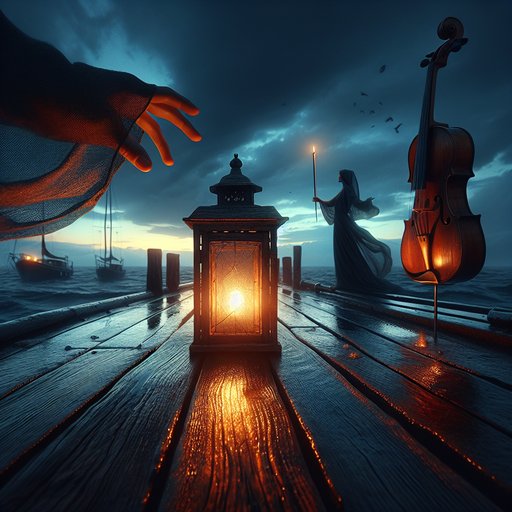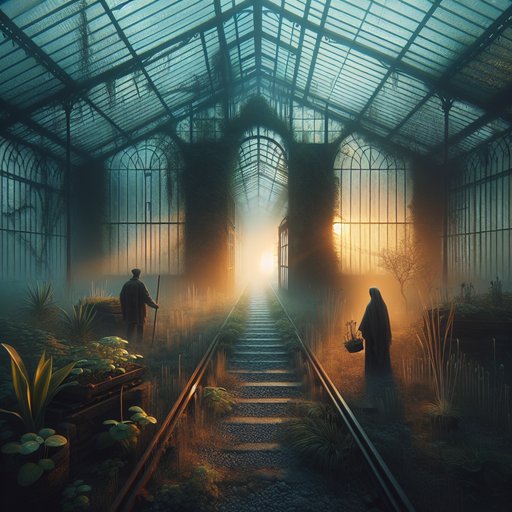
On the wind-swept quay of a small harbor, a lantern maker and a cellist teach themselves a language that uses light, wood, and the spaces between breaths. Without a single word, they draw close enough to share storms and misreadings. When hearing dims and the horizon beckons, their rituals of gesture and craft must decide what silence can carry and what must be left to the tides.
At dusk, when the tide pressed its cool hand to the pier and gulls scribbled across the sky, she hung a line of paper moons from a rusted hook. Each lantern was a different tenderness, cut with tiny slits so the wind could speak through them. He set his cello case down on a stack of lobster crates and tuned by memory, by salt, by the small ache of calloused tenderness at his fingertips. When he drew the bow across the strings the first time, the note turned the air to glass.
She looked up and studied the way it made the lanterns tremble, the reflection wobbling on water like the belly of a sleeping fish. He played again, softer, and she responded by lifting one lantern and lowering it, twice, a nod in the grammar of lamps. He answered with a figure that rose and sank. The harbor, in that moment, felt inhabited by listening alone.
They returned the next evening because they had both been unable not to. She brought a flock of smaller lanterns shaped like swallows and stuck their wires into the cracks between the pier planks so they seemed to hop about. He found a strip of red cloth and tied it near the frog of his bow, a mark that changed the color of the music when he wanted to say bravery. They built a lexicon in the lilt of his wrist and the tilt of her lamps.
When she hung a lantern on the lowest rung of a bent ladder, it meant longing; when he brushed the open strings and let them bleed into one another, it meant stay. On a fog-damp night she left him a small stone painted with a blue wave; he tucked it into his pocket and played a line that sounded like a shoreline wearing away. He never said thank you. He puddled the notes around the space where thank you would fit and let them listen to themselves.
The first time she followed him away from the square, he did not turn to see if she was coming, but he placed his palm on posts and shutters as if he were laying breadcrumbs, and she traced each one after him so there would be no doubt she had understood. His workshop turned out to be a room over a fishmonger, with a ceiling the color of old pearls and windows that breathed resin and tide. Shavings curled on the floor like pale seashells. He touched the ribs of an unfinished instrument with the back of his fingers and she stood close enough to feel the vibration in the wood when he knocked it, just once.
She did not ask to touch. Instead she rolled up her sleeves and swept a corner where the dust had accumulated in a lazy spiral, then unrolled a sheet of rice paper on a bench and painted a small lighthouse in chalky whites and grays, the light itself an empty circle that the room seemed to fill. He stared at it and then, with a blackened fingertip, drew a moth on the back of her wrist. She smiled down at its fragile wings, nodded, and blew at it, as if to test whether it could ever leave.
By late winter the harbor had learned their rituals. Old men on benches stopped chewing their tobacco mid-turn to watch her light the wick of a lantern with a sprig of rosemary. Children understood that the cellist would begin with the tide, not the clock. In the workshop, he sometimes set the cello against his chest and closed his eyes, not listening but feeling, the low G string a bar of baked bread under his sternum.
The first time the ringing began, he did not flinch, only turned the scroll a fraction and waited for the world to right itself. That night, when she raised a lantern cut with a pattern like raindrops and let it spin on its wire, he played the raindrops and also the roof they struck and also the pause after. But at the end he dragged his finger across his ear lobe and tilted his head. She came nearer and tapped twice on the bone behind his ear, a question offered with the care of a hand hovering above a sleeping animal.
He lifted his shoulders and made a ripple with his fingers as if showing the way heat makes the road swim at noon. She did not press. She slid her palm along his forearm, one, two, three, and he understood this was a counting of breaths and not an accounting of costs. A storm swelled late that month, a spill of slate and slate and then a seam meaning it would split.
Her studio, a narrow room with a cracked plaster angel above the door, took the first fist of rain as if it were rain and the second as if it were blessing. On the third, the roof surrendered. He arrived soaked, his bow arm wrapped in an oiled cloth, and found her bailing with a saucepan while the paper moons lay like torn petals against the floorboards. He set the case high at the windowsill and knelt beside her, the two of them moving in a rhythm that needed no conductor.
When the water had dropped to a shine on the boards, he carried a lantern to the threshold and lit it with hands that shook from cold. She pushed the wet paper toward the corner with her bare feet, then dipped her brush into the pooled muck and drew lines on the floor, a whale with a house on its back, a thread running from the chimney to the sky. He watched her mouth shape unvoiced vowels at the whale, as if naming it without air. When she finished she pressed the brush into his hand and he answered by striking the cello with fingertips, not bow, the thump and hum turning the puddles into trembling circles.
You could imagine, if you needed it said, that the floor learned to keep time with them. The days after the storm were lit like wounds, raw brilliance around edges of loss. She rebuilt with what she had, and what she had was a pocketful of wire and enough paper to give the air thoughts. He repaired a crack in his better instrument and found, almost by accident, that if he set its back against the wall and played, he could feel the shape of the note return to him through the plaster when his ears refused.
She began to mark her lanterns with more than leaves and fish; she cut out ears and palms and tiny hearts with a notch missing, and sometimes an eye that was a spiral, the way a shell thinks. He answered her new cuts with rhythms she could count in her collarbone. He would pluck a pattern against the wood and she would press her palm to the instrument’s side and nod when she felt it, light shifting in her eyes with each pulse. It seemed to both of them that the world had been trying to tell them all along that sound is only one kind of touch.
The invitation came folded within an object rather than paper. A courier delivered a porcelain ship with a sail that caught the windowlight. It was glazed the color of the sea when it is pretending to be shallow. She tilted it, watched the gleam slide, and then carried it to the pier in her arms like a loaf of bread.
He saw it and understood that someone far away had seen her light and wanted it to travel. He played a melody like a harbor hand unlashing and relashing a line, a melody with the sway of trust and the ache of its cost. She set three lanterns in a triangle and lifted one, then another, then the third, as if to ask in order. He set his hand on his chest where the ribs made harp shapes under skin.
Her breath snagged, something like a laugh with no sound in it, and she raised a swallow lantern high enough to make it a star. He shook his head, unsure whether she was asking should I fly or promising I will return. The timing between them, once as clean as a metronome, stumbled and overcorrected. She left the porcelain ship with him that night, and he kept it on the windowsill where it collected the bones of sunlight.
For the first time since the day of the pieced-together lighthouse, absence took a chair and made itself large at their table. He came late and left early. She lit her lanterns in nervy clusters and then stepped back as if surprised by her own brightness. He kept a small drum on his bench and tapped patterns with the heel of his hand until he found one that carried even when his ears were all winter rustle.
He took it to the square and played with the heel and then the fingertips and then the full palm, sending out call after call like a bird that has been told there might be another of its species somewhere in the forest. She stood behind him, unseen, and projected a troupe of paper shadows across a wall while the drum spoke. Wolves, cranes, a lighthouse whose light wound around the wolves and cranes like a ribbon. He stopped and pressed the drum to his ear and heard nothing, only the hollow of a small body made to hold air.
He turned and there she was, fingers stained indigo, lifting her hair to show him the place behind her ear he had touched months before. He set his open palm to the hollow at her throat, catching the little quake of her pulse, and let his hand rest there for a long time. They did not leave until the fog horn sent its long animal moan across the dark, and both of them looked up as if called by a name neither of them could say. They met at the lighthouse on a night too calm for warnings.
She had rigged her lanterns along the stairs in a succession of colors that changed as you climbed: low blues that sighed, quick greens that pried at the breath, pocketed oranges that made your stomach remember. He brought the cello and the drum and one more thing, a thin ring he had carved from maple, the grain running around it like a small river. In the lantern glow she turned the ring in her palm, then slid it over his bow hand, soft as slipping a fish back into water. He set the instrument not on his shoulder but against the iron rail that spiraled up the room and drew the bow.
The whole lighthouse hummed, the railing waking and carrying the tone into the floor, into the wall, into the glass. She placed her palms flat and narrowed her eyes, feeling the hum in the pads of each finger, the vibration traveling through her upraised arms into a part of her that had always believed in invisible bridges. People gathered on the rocks outside, drawn by the bloom and fade of light keeping time with his wordless song. When he finally stopped, the lanterns kept pulsing a moment longer, like a heart remembering the last thing it loved.
On the morning the ship threw its rope to the pier and drew a black seam along the sky, she went to his workshop carrying a canvas rolled tight. He had spent the night scraping resin into a little tin and polishing a small block of rosin until it gleamed like honey. On his bench lay the porcelain ship, the blue wave stone, the moth she had long since washed from her skin redrawn on a scrape of paper with a pencil stub. She touched each as if reading them in order.
He reached for a small wooden box he had made with two compartments. In one, he placed a feather, a key without a door, three fish scales, and a length of the red cloth from his bow. In the other, nothing. He closed the lid and pressed it into her hands, then took the canvas and unrolled it.
He saw himself there, not as a face but as a house on the back of a whale, a lighthouse afloat in a bowl of the sea with lanterns hanging from stars. She lifted both arms as if to embrace the ghost of what would not fit between them. He stepped carefully into that space anyway. She went.
There was no explanation in the moving of feet down a gangplank and no apology in the way she lifted her chin and breathed the salt like medicine. He stood on the pier and watched the ship turn slow as a thought and set off toward the line where sky pretends to be land. He did not wave. He took the drum and tapped out the pattern that meant I am here, then laid his ear not to the drum but to the wooden planks of the pier, listening for the reply the water might make.
Weeks later, an envelope arrived without a letter, only a single lantern, folded flat to survive the trip, cut with a pattern like a moth and a spiral and an empty ring. He threaded it with wire and hung it over his bench, and at night when he leaned the cello against the wall and played without listening, the lantern swung in tiny arcs, drawing punctuation in the air. In the new city, the light was different. Her studio overlooked an estuary where the tide took its time deciding who it belonged to.
She hung her lamps on a nail hammered into a crossbeam and found that when she cut a lantern with the memory of his drum, it cast shadows like fingerprints. She took the wooden box he had given her and placed the key without a door on the sill when she wanted to conjure home. She traced the length of red cloth across her own wrist like a pulse when she needed bravery. In the markets she found shells with holes and threaded them on string, then held them to her ear to hear something like a shore even when the city slept heavy.
She painted a lighthouse on a borrowed wall, its beam not white but the amber of rosin, the sweep of it the same as his bow when he meant yes. Across the ocean, evenings found him on the pier, playing to the iron rail and the wooden planks and the shins of benches, letting the vibrations carry what his ears could not catch. Sometimes, without warning, the actual lighthouse blinked in a sequence only two people in the world could read, and he smiled, and the water, keeping confidences as always, smoothed its face for a moment and looked back at the sky.








































